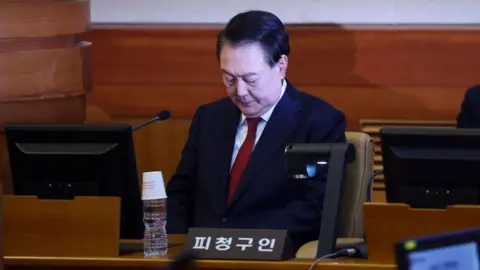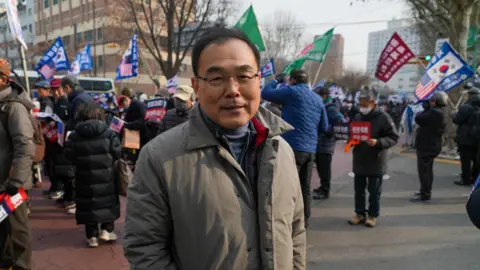 EPA
EPASuspended South Korean President Yoon Suk Yeol made his first appearance at his impeachment trial, where he denied ordering the arrest of lawmakers as he attempted to impose martial law.
Parliament voted to impeach Yoon last month and last week the Constitutional Court opened a trial to decide whether to permanently dismiss him from office.
Yoon is also the subject of a separate criminal investigation into whether he led an insurrection. He has been detained since last week.
Security was tight on Tuesday when Yoon was transported by van from the detention center where he is being held to the Constitutional Court.
Police formed human walls and erected riot barricades to prevent hundreds of his supporters gathered nearby from getting too close. Last weekend was marked by violence as dozens of Yoon supporters clashed with law enforcement and broke into another courthouse.
On Tuesday, Yoon was asked if he had ordered military commanders to “take out” lawmakers from Parliament the night he declared martial law, to prevent them from overturning his order.
He said, “No.”
Military commanders had previously claimed that Yoon gave such an order on Dec. 3, after lawmakers climbed fences and broke barricades to enter the parliament building and vote against Yoon’s declaration of martial law.
“I am a person who firmly believes in liberal democracy,” Yoon said in his opening speech Tuesday.
“As the Constitutional Court exists to safeguard the constitution, I ask you to carefully examine all aspects of this case,” he told the judges.
During the hearing, which lasted nearly two hours, Yoon and his lawyers argued that the martial law order was “a formality that was not intended to be carried out.”
Yoon had cited threats from “anti-state forces” and North Korea when he declared martial law, but it soon became clear that his decision had not been motivated by external threats but by his own domestic political problems.
Lawyers handling the case, selected by parliament, accused Yoon and his lawyers of making comments that were “largely contradictory, irrational and unclear.”
“If they continue to shirk responsibility as they did today, it will only count against them in the impeachment trial and cause even greater disappointment among the public,” prosecutors told the journalists after the hearing.
Outside the courtroom, Yoon’s supporters – who have become more agitated and aggressive of late – demanded that the suspended president be released and reinstated to office immediately.
They were forced to sit some distance from the court due to increased security measures. Waving their combination of Korean and American flags, some wore Maga-style baseball caps emblazoned with the slogan “Make Korea Free Again,” an echo of the campaign slogan used by U.S. President Donald Trump.
Some of their chants included calls for the execution of the leader of South Korea’s main opposition party, Lee Jae-myung, and the investigator in Yoon’s criminal case.
Several supporters told the BBC they believed Yoon’s declaration of martial law was an attempt to protect the country’s democracy.
They accused the opposition party of being pro-China and pro-North Korea and of wanting to turn South Korea into a communist country.
“This is a conflict between those who aspire to communism and those who aspire to democracy,” said Wongeun Seong, a 49-year-old businessman who joined the protest after returning from a lunch meeting. .

Former Defense Minister Kim Yong-hyunwho allegedly suggested martial law to Yoon, will testify at the next hearing on Thursday.
Yoon will be removed from office if at least six of the eight members of the Constitutional Court vote in favor of indictment. A presidential election must then be called within 60 days.
South Korea has been plunged into political chaos since the failed attempt at martial law. Thousands of protesters and Yoon supporters took to the streets on several occasions despite the winter cold.
The crisis has hit the country’s economy, with the won weakening and global credit rating agencies warning of weakening consumer and business confidence.
Additional reporting by Hosu Lee in Seoul



